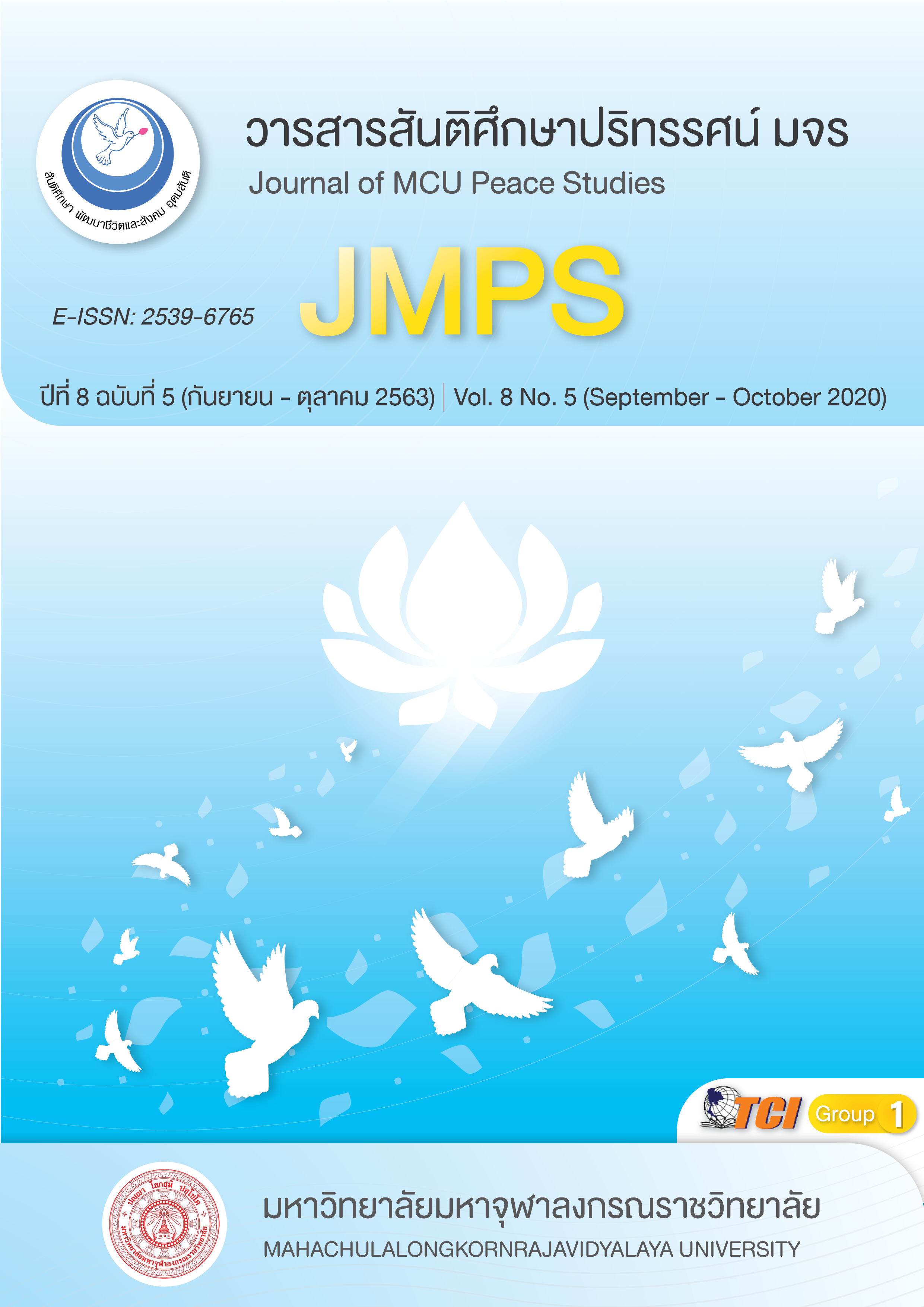การพัฒนาโปรแกรมการฝึกอบรมเพื่อเสริมสร้างความทนทานต่อภาวะกดดัน ตามแนวทาง Reality Pedagogy สำหรับวัยรุ่นในภาคตะวันออกเฉียงเหนือ
Main Article Content
บทคัดย่อ
บทความวิจัยนี้มีวัตถุประสงค์ 1) เพื่อพัฒนาโปรแกรมการฝึกอบรมเพื่อเสริมสร้างความทนทานต่อภาวะกดดันตามแนวทาง Reality Pedagogy สำหรับวัยรุ่นในภาคตะวันออกเฉียงเหนือ 2) เพื่อศึกษาผลการใช้โปรแกรมการฝึกอบรมเพื่อเสริมสร้างความทนทานต่อภาวะกดดันตามแนวทาง Reality Pedagogy สำหรับวัยรุ่นในภาคตะวันออกเฉียงเหนือ การวิจัยครั้งนี้เป็นวิจัยแบบ One – Group Pretest – Posttest Design กลุ่มตัวอย่างที่ใช้ในการวิจัยครั้งนี้เป็นนักศึกษาชั้นปีที่ 1 มหาวิทยาลัยราชภัฏร้อยเอ็ด จังหวัดร้อยเอ็ด จำนวน 30 คน ได้จากการสุ่มตัวอย่างแบบกลุ่ม สถิติที่ใช้ในการวิเคราะห์ข้อมูล ได้แก่ ค่าร้อยละ ค่าเฉลี่ย ส่วนเบี่ยงเบนมาตรฐาน และวิธีการวิเคราะห์ความแปรปรวนพหุคูณแบบวัดซ้ำ ผลการวิจัยพบว่า 1. โปรแกรมการฝึกอบรมเพื่อเสริมสร้างความทนทานต่อภาวะกดดันตามแนวทาง Reality Pedagogy สำหรับวัยรุ่นในภาคตะวันออกเฉียงเหนือมีทั้งหมด 14 กิจกรรม โดยเสริมสร้างความทนทานต่อภาวะกดดัน 5 องค์ประกอบ ได้แก่ 1) ความทนทานต่อความไม่แน่นอน 2) ความทนทานต่อความคลุมเครือ 3) ความทนทานต่อความคับข้องใจ 4) ความทนทานต่ออารมณ์ด้านลบ 5) ความทนทานต่อความไม่สบายทางกายและโปรแกรมการฝึกอบรมได้รับการประเมินจากผู้เชี่ยวชาญมีคะแนนเฉลี่ย = 4.42 มีความเหมาะสมในระดับมาก 2. ผลการใช้โปรแกรมการฝึกอบรม นักศึกษาที่เข้าร่วมโปรแกรมการฝึกอบรม มีคะแนนเฉลี่ยของความทนทานต่อภาวะกดดัน ก่อนการทดลอง
= 3.39 หลังการทดลอง
=3.85 และติดตามผลหลังการทดลอง 1 เดือน
=3.86 เมื่อทดสอบสมมติฐานทางสถิติ พบว่า คะแนนเฉลี่ยของความทนทานต่อภาวะกดดันหลังการทดลองสูงกว่าก่อนการทดลองอย่างมีนัยสำคัญทางสถิติที่ระดับ .05 และคะแนนเฉลี่ยหลังการทดลองและติดตามผลหลังการทดลอง 1 เดือน ไม่แตกต่างกัน
Article Details
ทัศนะและความคิดเห็นที่ปรากฏในบทความในวารสาร ถือเป็นความรับผิดชอบของผู้เขียนบทความนั้น และไม่ถือเป็นทัศนะและความรับผิดชอบของกองบรรณาธิการ ยินยอมว่าบทความเป็นลิขสิทธิ์ของวารสาร
เอกสารอ้างอิง
Acedemic of Roi-et Rajabhat University. (2019). Students Statistics. Retrieved July 31, 2019, from https://www.acedemic.reru.ac.th.
American Psychological Association. (2002). A reference for Professionals Developing Adolescents. Washington, DC. : US. Department of Health and Human Services.
Emdin, C. (2011). Moving beyond the boat without a paddle : reality pedagogy black youth, and urban science education. The journal of Negro Education, 80(3), 284-295.
Emdin, C. (2016). For White Folks Who Teach in the Hood and the Rest of Y’all Too Reality Pedagogy and Urban Education. Boston : Beacon Press.
Ehrlich, KB. (2012). I get high with a little help from my friends (and family) close relationships, distress tolerance, and risk taking in adolescence. College Park: The University of Marry land.
Muhomba, M., Chugani C.D., Uliaszek A.A., & Kannan, D. (2017). Distress Tolerance skills for collegeStudents : A pilot Investigation of a brieft dbt group skills training program. The journal of College Student Psychotherapy, 31(3), 247-256.
Department of mental health. (2016). Collection of academic articles Annual international
mental health conference mindfulness for healthy lives. (15th ed). Annual international mental health conference and Annual Child mental health and psychiatry conference: 13th Centra government complex hotel & convention centre changwattana, Bangkok.
Department of mental health. (2017). Stress and Suicide Report. Retrived November 16, 2017, from http://dmh.go.th/report/suicide/age.asp.
Department of mental health. (2018). National Mental Health Development Plan No. 1. Retrived January 31, 2020, from https://www.chiangmaihealth.go.th/cmpho_web/
document/190616156067890738.pdf.
Gaher, R., Hofman, N. L., Simons, J., & Hunsaker, R. (2013). Emotion regulation deficits as mediators between trauma exposure and borderline symptoms. Cognitive Therapy and Research, 37, 466-475.
Jongudomkarn, D., Phuphaibul, R., & Nieamsup, T. (2019). Isan family well-being : suffering and happiness on poverty. Journal of nursing science & health, 42(2), 63-73.
Klinmalee, M. (2011). Students with Problems of Stress. Journal of Vocational and Technical Education, 1(1), 64-75.
Ruchiwit, R. (2013). Stress management for promoting mental health. Bankok: Thammasat Bookstore.
Rittakanakanon, P. (2006). Human Development. Bankok : Chulalongkorn University Bookcentre.
Nintachan, P., Vanaleesin S., Sanseeha, L.,Thammathai, K., & Pisamai, O. (2011). Resilience and Thai youth Risk Behavior. Rama Nurs J, 17(3), 430-443.
Prutipinyo, C. (2010). Principle of social research. Bangkok : jaroendeemunkongkarnpim.
Robkob, W., Skulphan, S., & Sethabouppha, H. (2018). Depression, alcohol drinking behaviors, and suicidal risks of Adolescents. Nursing journal, 45 (4), 144-158.
Royal Thai Government Gazette. (2018). National strategy for human development and capacity enhanching. Retrived December 25, 2019, from http:// www.thailibrary.in.th/wp- content/uploads/2019/08/ national-strategy-20yrs.pdf.
Sucaromana A. (2016). Resilience Quotient : RQ. Journal of MCU Peace Studies, 4(1), 209-220.
Taher, T. (2012). Exploring the impact of the implementation of reality pedagogy self-efficacy, social capital, and distributed cognition. New York : Columbia University.
Tantalanukul, S., & Wongsawat, P. (2019). Stress surveillance and care in adolescents The southern colledge network. Journal of nursing and public health, 6(2), 279-285.
Tayraukham, S. (2012). Advanced Statistics for Educational Research. Mahasarakham: Mahasarakham University Press.
Vongrachit, K. (2019). Adolescents consulted the most stressful problems. Retrived January 15, 2020, from https://www.bangkokbiznews.com/news/detail/865680.
Williams, A. D., Thomson, J., & Andrews, G. (2013). The impact of psychological distress tolerance in the treatment of depression. Behaior Research and Therapy, 51(8), 469-475.
Zvolensky. M. J., Bernstein, A., & Vujanovic, A. A. (2011). Distress tolerance : theory, research, and clinical applications. New York : The Guilford press.


